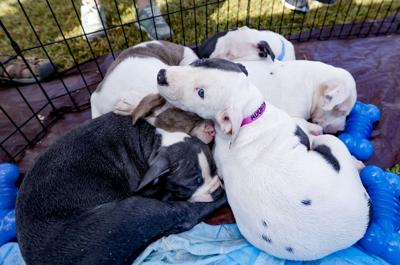Anyone who has adopted a puppy knows firsthand that, in the beginning, it can be challenging.
Puppies are similar to babies in that they need lots of attention, need to eat often, need lots of potty breaks, and will keep their humans up all night long, especially in the beginning. Dealing with puppy behavior in the right way early on is crucial, as this is a very impressionable time for a young dog.
Following are some common puppy behaviors and tips to help.
Potty training: No. 1 rule: puppies need to go, a lot! It is a good rule of thumb when a puppy is very young that he can go the number of hours he is months old before he needs a potty break. For example, a 2-month-old should be taken out every two hours, a 4-month-old, every four hours. Crate training is essential to potty training as dogs do not like to potty in their place and they will learn to wait for potty breaks to relieve themselves. Also, be prepared for and expect many accidents. Puppies are still learning so give some grace in this area.
Play biting: Puppy breath is irresistible, but puppy teeth are sharp! Puppies must be taught to be gentle with their mouths and teeth. Gentle “biting” is acceptable early on, but as he gets older, around 12-16 weeks of age, discourage him from placing his mouth on hands. Be sure to provide him with plenty of safe items he is allowed to chew on.
Jumping: When a puppy jumps up and paws at his owner, he is seeking attention. If this behavior is allowed when the dog is young and small, he will grow up thinking this is acceptable as an adult. If he is pushed down or scolded, he is still getting the attention he is seeking, even if it is negative attention. The best response is to turn and walk away without saying anything. The next time he approaches, make him sit before he has the opportunity to jump up, then reward and praise him for sitting.
Chewing: Hide the shoes! Chewing is a very natural behavior for a puppy, so it is important to direct him to chew on his chew toys and not your belongings. Buy several different items, and rotate them to keep him interested in his chew toys. If he is caught in the act chewing something he should not be, a stern “NO CHEW” is adequate punishment — then make him sit, praise the sit and then give him something that he is allowed to chew on. If the evidence is there, but he was not actually caught in the act, disciplining the dog after the fact will do no good, as he will have no clue what he is being disciplined for.
Barking: Barking is a normal response for all dogs. When outdoors, puppies will bark at all sorts of things: other dogs, strangers, kids, cats, birds, a leaf blowing in the wind, etc. As a good neighbor, never leave a dog outdoors unattended if he is a barker. As dogs get older, they will bark out of boredom. Dogs should never be “forgotten” and left to entertain themselves day in and day out in the yard. Keep them indoors and part of the family so that the time spent outdoors will be stimulating and enjoyable.
Training: Training can benefit a dog of any age, but especially a puppy. It is a great opportunity to get some guidance on the proper ways of training a new puppy to set everyone up for success. The benefits can include helping with impulse control, addressing and preventing behavior problems, and providing important time sensitive experiences that will set your puppy up to be well-socialized and well-behaved.
In my 18 years as a dog owner, I’ve adopted a 10-week-old, a 10-year-old and everything in between. I prefer to adopt a dog that is past the puppy stage. But regardless of age, the rewards of having a dog are so worth it — even through the chewed-up baseboards and destroyed shoes.
Traci D. Howerton is the volunteer manager for Animal Rescue New Orleans (ARNO), a nonprofit, volunteer-based, no-kill shelter. For more information on ARNO, visit www.animalrescueneworleans.org.

